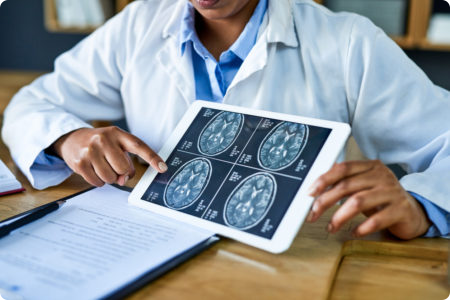Neurosurgery
Neurosurgery is the surgical specialty that deals with conditions of the central and peripheral nervous systems. Damage or disease that affects the brain, spinal cord, and/or peripheral nerves may be treated by neurosurgeons in a variety of ways, including:
- Medical management of head and spine trauma
- Neuro-oncological surgery (for spinal or intracranial tumors)
- Neurosurgical reconstruction
- Spinal fusion and decompression procedures
Surgeons primarily employ surgery to treat neurological issues but may also opt for nonoperative or minimally invasive methods. The goal is to enhance a patient's well-being and quality of life by addressing and alleviating neurological problems and symptoms. Seeking prompt neurological care is crucial, as our brain, nerves, and spine are vital for daily functioning. Neurosurgical interventions aim to optimize these systems, ensuring patients can continue leading fulfilling lives with improved neurological health.
Common Neurosurgical Procedures
Should you require neurosurgery, we can help. Our neurosurgical team treats many different central nervous system disorders, including the following:
Spinal stenosis results from the narrowing of the spinal canal, leading to nerve compression and often causing significant leg pain during even short walks. This condition can manifest along the entire spine, including the neck, upper back, or lower back, and is particularly prevalent among individuals age 50 and above.
Tumors are abnormally growing cell masses in the body, classified as benign (noncancerous) or malignant (cancerous). Benign tumors typically stay localized, while malignant ones tend to spread.
Intracranial or brain tumors are abnormal cell growths within the brain that often result in increased intracranial pressure. This pressure can damage brain cells, causing severe issues if left untreated. Symptoms include headaches, nausea/vomiting, vision changes, weakness on one side of the body, slurred speech, and coordination problems.
Spinal tumors lead to back pain, which can radiate to the limbs and worsen when lying down. Additional symptoms may include muscle weakness and sensory loss. These tumors can occur at any age but are more common in adults over age 40, especially those with a family history of such tumors, increasing their risk.
Degenerative disc disease is characterized by the gradual, persistent wear and tear of the discs cushioning the vertebrae in the spine, occurring throughout the neck, upper back, or lower back.
Common symptoms encompass pain, numbness, tingling, or weakness in the affected disc area. These symptoms can also extend to regions like the buttocks and legs. In certain instances, the condition may be asymptomatic, but seeking medical evaluation is crucial. Neglected degenerative disc disease can lead to complications such as herniated discs and loss of bowel or bladder control. Early diagnosis and intervention are essential for effective management.
Spinal injuries can affect different parts of the spine, including the neck (cervical spine), upper to middle back (thoracic spine), or lower back (lumbar spine).
These injuries primarily fall into two categories: disc or vertebral injuries and spinal cord injuries. Discs serve as cushions between spinal bones (vertebrae), while the spine safeguards the spinal cord—a nerve bundle linking the body to the brain. Trauma to the head or spine can harm discs, vertebrae, and potentially compress nerves, leading to various symptoms like pain and numbness.
Such trauma may result from car accidents, falls, violence, or sports-related incidents. Degenerative conditions like arthritis and osteoporosis can weaken bones and joints, increasing the risk of head or spine injury upon forceful impact.
After neurosurgery, your rehabilitation regimen will likely include physical therapy, exercise, and medication. Your neurosurgeon will work with the rest of your healthcare team to ensure that you continue to heal and improve after your surgery.
Neurosurgery in North Dakota
Do you require neurosurgery? The Bone & Joint Center in Bismarck, North Dakota, has the medical experts with the training and experience you need.
If you have questions about an upcoming procedure or would like to make an appointment, call the main line for The Bone & Joint Center at (866) 900-8650. You can also use our confidential and secure appointment request form. We look forward to assisting you with your orthopedic and neurosurgical medical needs.


